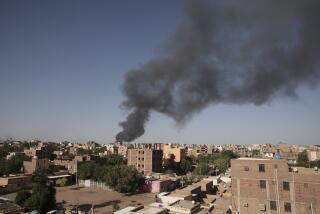Firepower Marked Somalia Pullout : Africa: Local newspapers accuse Marines of overreacting in final hours of operation. Commander defends troops.
- Share via
MOGADISHU, Somalia — Perhaps because they arrived so tightly wound and trod so warily, U.S. Marines accomplished the evacuation of U.N. forces from this land without loss of American life.
But their nervous caution took its toll on Somalis.
In the final stages of the troops’ retreat, every bullet fired against them was answered, it seemed, by 100.
And after killing five Somalis, some for shooting in the direction of Americans and others for just appearing to be threatening, the U.S. command stopped counting Somali casualties.
“I’m not counting bodies. . . . I’m not interested,” Marine Lt. Gen. Anthony C. Zinni, the commander of the operation, said Friday.
He spoke after straggling back to his task force flagship just before dawn, soaking wet. His amphibious attack craft had broken down, leaving it bobbing helplessly in the Indian Ocean for two hours.
Two brisk, sustained firefights engulfed retreating Marines in their final hours in Somalia on Thursday night and Friday morning.
At times, the sky glowed from tracer rounds like hot wind blowing through a campfire. Maybe half a dozen lesser skirmishes broke out here and there as the withdrawing foreign forces shrunk their perimeter to a small sand flat on the edge of town.
*
Marine commanders said they were up against random bandits, looters, gunmen on drugs and simply the curious--not Somalia’s organized clan militias. The clan fighters are feared for their reckless tactics and were responsible for most or all of the 42 U.S. combat deaths sustained when the American military deployed here from 1992-’94.
Small arms and machine guns are the primary weapons used by Somalis, although Americans said they also may have been targeted by a couple of rocket-propelled grenades and perhaps a mortar or two.
Marines responded with M-16s, machine guns and occasionally with 25-millimeter cannon fire. They also offered a steady series of warnings broadcast by loudspeaker.
The heaviest weapons in the task force arsenal, such as naval guns offshore and fixed-wing gunships and helicopters overhead, were not used except to fire illumination rounds. And except for one last-minute dose of “sticky foam” sprayed on a gate, the withdrawing Marines did not use their experimental storehouse of non-lethal riot weaponry.
The Marines landed in Mogadishu on Tuesday to provide protective cover for the withdrawal of the last U.N. peacekeepers, ending a long, unsuccessful effort to bring order to Somali society.
Newspapers in Mogadishu accused the Americans of overreacting on the final night of the withdrawal.
Mohammed Farah Aidid, the brutal and powerful clan leader, and his Somali National Alliance put the number of Somalis killed by departing U.S. troops at 13, with 30 wounded.
“That was the last wrong footsteps of international forces,” Abdulkarim Ahmed Ali, a close political ally of Aidid’s, was quoted by the Reuters news service as saying.
*
All this criticism, however, should be kept in perspective: Somalis have been fighting among themselves in the streets of Mogadishu almost nonstop since 1991.
Some veteran U.S. officers also indicated concern about the intensity of the Marine machine-gun fire in the final three hours. At a battalion command post at the departure site of Green Beach, an officer barked across the radio network: “Let’s show a little fire discipline. . . . We’ve had quite a few rounds spilling over into town.”
Farther north on the beachfront retreat road, a colonel was observed scolding a Marine for firing toward a crowd of Somalis. “Do you know what your target was? There were women and children out there.”
Zinni said he believed that his task force, which for a time included a contingent of Italian marines, had shown great discipline.
“I was deeply impressed by the restraint that all coalition forces showed, even when I was starting to waver myself,” he said.
Still, his staff confirmed that Zinni ordered a review to ensure that Marines had not poured out more fire than necessary. The general acknowledged hearing radio warnings of rounds spilling into Mogadishu.
More to Read
Sign up for Essential California
The most important California stories and recommendations in your inbox every morning.
You may occasionally receive promotional content from the Los Angeles Times.












